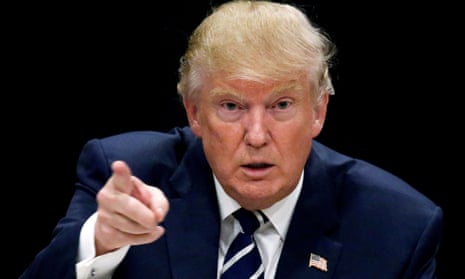The last time a Republican president took office after losing the popular vote, he made it clear that ethics were his highest priority. How could we tell? At every campaign stop, George W Bush ended his stump speech by raising his right hand and promising to uphold not just the laws of the land but what he called “the honor and dignity of the office”. For good measure, he added: “So help me God.”
We may all need divine intervention to defend ethics inside the new US Congress and the new Trump administration.
It’s not clear why the new Republican-dominated Congress thought it was a good idea to gut the Office of Congressional Ethics. But it is clear why they decided to abandon the plan: public pressure from social media and a deluge of phone calls to their offices.
House Republicans apparently felt burdened by all those pesky investigations into their questionable conduct. But they couldn’t bring themselves to make that argument in public, so they voted to gut the office behind closed doors on a public holiday.
Instead it was left to Kellyanne Conway, counselor to a swamp-draining president-elect, to defend the anti-ethics vote in public, telling ABC News: “There’s a mandate there for them to make significant change.”
Funny. The only Republican discussion of ethics through the election year was their insistence that Hillary Clinton was unqualified to be president because of her private email server. That’s even less of a mandate than President-elect Trump after losing the popular vote by almost 3 million.
Conway complained, like all those oppressed members of Congress, that the ethics office suffered from “overzealousness”.
“We don’t want people wrongly accused and we don’t want people mired in months if not years of ethical complaint review,” she explained.
This from the campaign manager of a candidate who insisted there was a law and order crisis in America. It would be refreshing to hear Conway’s concerns about overzealous policing in US cities, or the suffering of people mired in years of criminal justice proceedings.
Instead we got to hear a couple of tweets from her boss, who also criticized the ethics office as “unfair” before questioning the Republicans’ priorities.
For that nudge on priorities, many in the media gave Trump all the credit for the House Republicans caving on its ethics evasions.
Welcome to the slippery moral slope of Trump’s Washington. A president-elect who continues to enrich his own business through the course of his presidential transition chides a new Congress over ethics.
Never mind the hypocrisy and lies about “draining the swamp”. Of course Trump thinks there are other priorities than ethics. Otherwise he wouldn’t be meeting with his Indian business partners, and his new Washington hotel might not do business with foreign diplomats.
He might find his treasury decisions compromised by his large debts to foreign banks, his choice of IRS commissioner compromised by his personal tax audit and his new hotel lease compromised by the fact that he is now his own landlord.
This is the same slippery slope that places the publisher of far-right garbage inside the West Wing. Steve Bannon hasn’t personally written racist or antisemitic stories; he was merely the executive chairman of Breitbart which published those stories. Just as Trump isn’t really going to deport millions of undocumented immigrants this month; he merely stoked racial resentment with that promise.
Back in the 1990s, conservatives called this moral relativism Slouching Towards Gomorrah.
Today the Republican party is slouching towards something uncomfortably close to Moscow.
For the past eight years, the Republicans have been seized by an anti-Obama fever that was supposedly rooted in a constitutional defense against an abusive president. If there was any point of agreement between all those Republican primary candidates, it was the notion that Obama had ignored the founding fathers.
And yet here we are on the brink of inaugurating a president who thinks nothing of Article I of that same constitution, and its clear prohibition against the kind of foreign dealings in which Trump is so expert.
As ethics experts from both the Bush and Obama administrations have written, the founders saw the so-called emoluments clause as a way to stop corruption by foreign powers. If a president accepts any gifts and benefits from foreign nations, he faces the threat of impeachment.
Instead the newly elected Trump claims, wrongly, that there is nothing to prevent him from being president of the United States and CEO of his company at the same time. “In theory I could run my business perfectly and then run the country perfectly,” he told the New York Times.
It takes real leadership to create a culture of ethics, and it takes very little leadership to destroy any semblance of ethics. It’s only natural that the House Republicans would follow Trump’s lead by treating ethics as some kind of low-priority interference with their real business: business itself.
Having sworn to uphold the dignity of the presidency, George W Bush kept his promise to keep his pants on in the Oval Office, after two years of the Monica Lewinsky saga. Setting aside a catastrophic war and approving torture, he was indeed true to his family. He also never sought to profit from the presidency through the kind of private business deals so beloved in banana republics.
But even Bush’s presidency was undone by unethical conduct in Congress and a House Republican party that misunderstood the notion of a mandate. After finally winning the popular vote in the upset victory of 2004, the House set itself on an anti-immigrant path that destroyed Bush’s self-proclaimed political capital.
Along the way, the same Republican party was embroiled in a series of corruption scandals personified by the disgraced lobbyist Jack Abramoff. The result of those scandals was nothing less than the creation of the congressional ethics office.
After serving several years in prison, Abramoff (today a supporter of ethics reforms) now condemns the same party he once courted for having misread the voters’ desire for reform in last year’s election. “I guess some people in Washington still don’t get what happened in November,” he told Politico.
Single-party rule rarely ends well. Two years after Bush’s thumping re-election, Democrats took control of Capitol Hill. Two years after Obama’s historic win in 2008, Republicans took back the House.
The voters’ desire for reform will not be satisfied by the survival of the congressional ethics office. And it certainly won’t be satisfied by the sight of the Trump children running the president’s businesses.
If Donald Trump fails to drain his own family swamp, he will quickly discover how you can win the electoral college but lose the battle for power.

